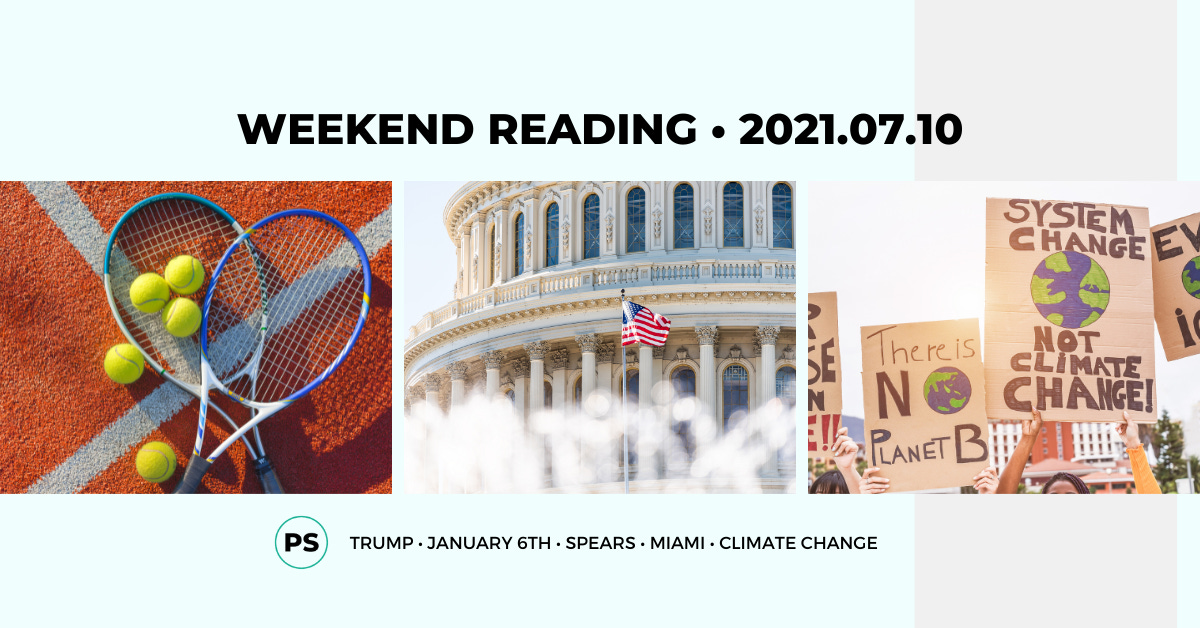Weekend Reading: Discussing Critical Race Theory, Remembering Anthony Bourdain, Driving Across Texas, and More
The best reporting and writing from the past week, and context to understand it.
There’s a lot of great journalism out there. Every week, in a format short enough that it won’t be clipped by your inbox, we aim to share some of the best, with additional context for understanding the biggest news of the day. This is a weekly digest of stories you can savor and reporting you can rely on.
A Haunting New Documentary About Anthony Bourdain
Helen Rosner, The New Yorker
Academy Award-winner Morgan Neville’s new documentary, Roadrunner, has revived interest in the larger-than-life star that was Anthony Bourdain. In the film, he’s portrayed as both the hero and the villain, Rosner says. She writes: “‘When I’m making a film, I often feel like the instructions are in the box,’ [Neville] told me. ‘How I should tell a story is often expressed by the subject: Mr. Rogers should be simple and deep and loving storytelling; Orson Welles should be chaotic and smart storytelling. And this film — Tony — is all about gray.’”
🎥 Roadrunner: A Film About Anthony Bourdain — Focus Features
📖 The Anthony Bourdain Doc Is No Hagiography — Dana Stevens, Slate: One of the best movie critics in the business, Stevens makes the reader want the movie to be available immediately.
This choice to abandon a traditional chronological timeline effectively focuses the documentary around Bourdain’s uneasy relationship to fame: One minute he is joshing warmly with fans who recognize him in the street; the next he is anxiously holed up in his hotel room. But it also leaves the viewer unmoored in time and space, unsure of how some of the events we see relate to one another. Instead, the thread Neville follows through Bourdain’s last 20 or so years of life is an affective one: where he traveled, whom he loved, how he felt about himself and his place in the world, and how his friends, family, and professional partners felt about him.
🗄️ From 1999: Don’t Eat Before Reading This — Anthony Bourdain, The New Yorker: Rarely is there ever such a clear line of demarcation, a moment that separates the beforetime from everything that came after, but Bourdain’s first story in the New Yorker, which would go on to become Kitchen Confidential, gave birth to the celebrity whose passing so many still mourn.
🎵 From Bob Dylan to Velvet Underground: Anthony Bourdain's 25 Favorite Songs to Cook To — Jack Whatley, Far Out: Just what it sounds like. If you can’t match his skills in the kitchen or his seemingly endless supply of charm and wit, you can at least make your subpar grilled cheese with the same music playing in the background.
How to Manufacture a Moral Panic
Sarah Jones, New York
You’ve undoubtedly heard the term critical race theory in the news, and chances are you’ve heard it’s a scourge coming to infect the minds of kindergartners everywhere. None of that is true, in case you’re wondering. It’s a useful legal theory through which laws are examined for how they might contribute to systemic racism. It’s advanced and heady stuff, not the boogeyman you’ve seen discussed on cable news. Where did that boogeyman get its beginning, you might ask? Look to Christopher Rufo, the right-wing activist.
📖 There Is No Debate Over Critical Race Theory — Ibram X. Kendi, The Atlantic: “The United States is not in the midst of a ‘culture war’ over race and racism. The animating force of our current conflict is not our differing values, beliefs, moral codes, or practices. The American people aren’t divided. The American people are being divided.” Kendi became a favorite target of those decrying critical race theory, but, as he points out, the whole exercise by the right is simply building up a straw man that they can attack. They’re defining terms and attributing intentions and motives that aren’t based in reality, and Kendi wonders what a person’s supposed to do in the face of such tactics.
📖 First It Was Sex Ed. Now It’s Critical Race Theory. — Alex Samuels & Kaleigh Rogers, FiveThirtyEight: A great example of how there really are no new stories. The uproar over critical race theory is just the latest incarnation of a particular type of moral outrage toward what’s being taught in schools, and you already know many of the most famous examples — sex education and the granddaddy of them all, evolution.
📖 Nikole Hannah-Jones Just Proved the Correctness of Critical Race Theory — Paul Butler, The Washington Post: The fact that those crying about the need to banish critical race theory from school curricula are the same crying foul about “cancel culture,” and how it was a perversion of political correctness that should be avoided in favor of embracing diverse viewpoints. It seems unlikely they’ll be moved by their own rank hypocrisy as they advocate for laws banning a legal theory (that isn’t actually being taught to their children in the first place) and inclusivity more generally. Nor are they likely to appreciate the irony that the treatment of Hannah-Jones at the University of North Carolina–Chapel Hill that was caused by her Pulitzer Prize-winning 1619 Project was a picture-perfect example of what critical race theory seeks to analyze. Her treatment could be a case study in a legal theory class.
Lone Star
David Wright Faladé, The New Yorker
A short personal essay that can’t help but leave the reader wanting more. A teenager rides along with his stepdad, a deputy sheriff who has to transport a prisoner across Texas.
📖 New Texas Abortion Law Enlists Activists to Harass Providers in Court — Ed Kilgore, New York: Back in 2018, The Atlantic’s Adam Serwer coined a phrase about the Trump administration: “The cruelty is the point.” (Also the title of his new collection of essays on the Trump years.) There’s a case to be made that Texas’ recently passed ban on abortions after six weeks (a period before many women even know they’re pregnant) is draconian enough, but a grand, sweeping enforcement provision allows everyday citizens to sue anyone who provides an abortion or assists a woman in seeking an abortion. (Not only that, the state will reward any citizen who’s lawsuit is successful with a $10,000 reward.) Truly dystopian stuff.
📖 Behind the Partisan Drama Lies a Profoundly Serious Struggle Over Who Gets Shut Out Under Texas Voting Laws — Alexa Ura, The Texas Tribune: If you’ve heard anything about Texas in the past week, it’s probably something to do with the state’s Democratic lawmakers staging a dramatic exodus from the state to prevent the Texas Legislature from having a quorum to conduct business, namely, passing a bill that will greatly restrict voting access that was brought about after Trump’s Big Lie that the 2020 election was fraudulent. So the entire delegation went to Washington, D.C., and says it’s prepared to stay there until the end of the session.
📖 Texas Has Broken My Heart — Mimi Swartz, The New York Times: The Texas Monthly executive editor wonders on the page whether she ought to leave Texas. The past legislative session saw regressive laws placed on the books, but there was so much obvious work to be done that was ignored.
What was not on the agenda for Texas lawmakers in this session? Let’s see, rescuing our decaying infrastructure — the power grid that failed catastrophically during the February winter storms that left at least 151 people dead — along with desperately needed improvements to health care and education. According to our state leaders, those issues are not as important as keeping trans children from playing in school sports.
📖 ‘Dr. Death’ Condemns Christopher Duntsch, but the Real Culprit Is Texas’ Broken Health-Care System — Saul Elbein, Texas Monthly: An article that’s ostensibly a review of the new TV series Dr. Death, which was adapted from a podcast of the same name, is actually a reconsideration of the framing devices used by the author when he first helped break the story for the Texas Observer back in 2013. (Spoiler: The article will give away the ending of the podcast and TV show, so if you’re listening or watching and want to remain spoiler-free, consider returning to this one after you’ve finished.)
More of Our Favorites From the Past Week
Writing, Like Geology, Requires a Little Digging — John McPhee, Science Friday
Jason Sudeikis Is Having One Hell of a Year — Zach Baron, GQ
Hard Bargain — Daniel Brook, Harper’s
‘I Was Drowning Inside’: How the Sports World Failed When Three Black Women Needed Help — Orion Rummler, The 19th
Michael, Dwight and Andy: the Three Aesthetics of the Creative Class — Alex Danco, Dancoland
The Follow-Up
The news doesn’t stop. If you checked out last week’s edition and found the topics interesting, here’s a collection of stories published since.
Britney Spears’ Conservatorship
📖 Britney Spears Says She Wants to Charge Her Father With ‘Conservatorship Abuse’ — Emily Kirkpatrick, Vanity Fair
Donald Trump’s January 6
📖 ‘I Alone Can Fix It’ Book Excerpt: The Inside Story of Trump’s Defiance and Inaction on Jan. 6 — Phillip Rucker & Carol D. Leonnig, The Washington Post
Climate Change
🎧 The Heat Wave That Hit the Pacific Northwest — Astead W. Herndon, The Daily
The Surfside Condo Collapse
📖 Inside the Effort to Return Belongings Lost in the Surfside Condo Collapse — Meryl Kornfield & Brittany Shammas, The Washington Post
Tennis
📖 Why Tennis Stars Are Saying No to the Tokyo Olympics — Joshua Robinson, The Wall Street Journal
The Postscript
This week, elsewhere on The Postscript.
Don't Overestimate Our Federal Government's Ability to Save the News Industry
A review of Martha Minow's “Saving the News: Why the Constitution Calls for Government Action to Preserve Freedom of Speech.”
Stories That Matter: How a Political Reporter at a Local Non-Profit Broke the Nikole Hannah-Jones Tenure Story
In a state where higher education is increasingly political, Joe Killian's decades of political reporting helped him earn the trust of both Jones and the trustees blocking her tenure.




